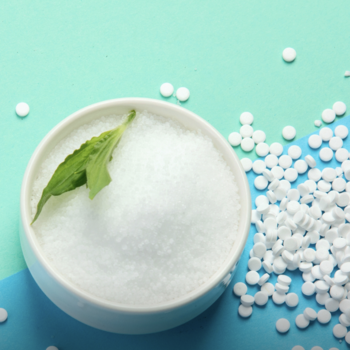On May 15, 2023, the World Health Organization (WHO) released new guidelines[i] concerning non-sugar sweeteners (NSS).
The guidelines advise against utilising NSS for weight management or reducing the risk of non-communicable diseases (NCDs).
So, what are artificial sweeteners? Let’s explore their potential benefits and risks and look at what constitutes safe consumption levels in this article.
Understanding sweeteners
There are two main categories of sweeteners: natural and artificial.
Natural sweeteners come from plants and other natural sources, while artificial sweeteners are made from synthetic compounds.
Natural Sweeteners:
- Sugar (Sucrose): Derived from sugar cane or sugar beets, sucrose is the most common natural sweetener. It is found in various forms, such as granulated sugar, brown sugar, and powdered sugar.
- Honey: Produced by bees from flower nectar, honey is a natural sweetener with a distinct flavour and potential health benefits. However, it contains fructose and glucose and should be consumed in moderation due to its high sugar content.
- Maple Syrup: Extracted from the sap of sugar maple trees, maple syrup, is a popular natural sweetener often used in pancakes, waffles, and desserts.
- Agave Nectar: Derived from the agave plant, agave nectar has a lower glycemic index than sugar and is commonly used as an alternative sweetener.
- Stevia: Stevia is a natural sweetener extracted from the leaves of the Stevia plant. It is calorie-free and has gained popularity as a sugar substitute.
Artificial Sweeteners:
Non-nutritive sweeteners, artificial sweeteners, or sugar substitutes, are man-made substances that improve the sweetness of food and drinks without adding substantial calories. These compounds are much sweeter than sugar, requiring only small quantities to achieve the desired sweetness.
- Aspartame: Found in many diet sodas and sugar-free products, aspartame comprises two amino acids, phenylalanine, and aspartic acid. People with a genetic disorder called phenylketonuria (PKU) should avoid aspartame due to the potential accumulation of phenylalanine in the blood and other tissues, which can cause brain damage due to the sensitivity of nerve cells.
- Sucralose: Derived from sucrose, sucralose is heat-stable and widely used in baking and cooking. It’s found in products like Splenda.
- Saccharin: One of the oldest artificial sweeteners, saccharin is often used in sweeteners like Sweet’N Low.
- Acesulfame potassium (Ace-K): Used with other sweeteners, Ace-K is often found in sugar-free gum and candy.
What do Experts Say?
There has been a lot of discussion and research about the safety and potential health effects of artificial sweeteners. Despite being commonly used as sugar substitutes, there are still many questions and uncertainties surrounding these man-made compounds.
- Health concerns: Although results are inconclusive, some studies indicate a connection between artificial sweeteners and health issues like headaches, digestive problems, and a higher chance of developing conditions such as obesity, metabolic syndrome, and Type 2 diabetes.
- Weight management and metabolism: Some studies suggest that artificial sweeteners may lead to weight gain and increased cravings for sugary and high-calorie foods.
- Gut health: Recent studies suggest that artificial sweeteners may affect the microorganisms in our digestive system, known as gut microbiota. These changes may cause health issues such as obesity and metabolic disorders. However, the potential long-term effects of these changes are still unclear.
- Individual variability: Different sweeteners may affect people in different ways. Metabolic rate, genetics, and microbiome are some of the factors that determine how people react to these sugar substitutes.
Is aspartame consumption linked to cancer?On July 14, 2023, the International Agency for Research on Cancer, the World Health Organization, and the Joint Expert Committee on Food Additives released their findings on a risk assessment conducted of aspartame and its link[ii] to cancer, classifying it as a Group 2B carcinogen.
However, their findings revealed “limited evidence” for cancer in humans and specifically liver cancer. Despite this classification, their prior recommendation of an acceptable daily intake of aspartame of 40 mg/kg of body weight still stands. They affirmed that consuming aspartame within this range is safe.
For an average 70 kg woman, this would mean a limit of 2,727 mg of aspartame per day. This is equivalent to roughly 9 to 14 cans of diet soda, with each can containing about 250 mg. The organisations emphasised that further research is required to determine the cancer risk associated with aspartame conclusively.
Say NO to the ‘sweet’ taste
If you’re trying to decrease your consumption of sugary drinks or limit added sugars, there are numerous refreshing and healthier alternatives:
- Infusing water with fruits, lemon, lime, cucumber, or mint slices without added sugars.
- Naturally sweet herbal teas like chamomile, peppermint, or fruit-infused teas, hot or cold, without added sugar.
- Green tea is naturally sweet and has antioxidants. Add lemon for extra flavour.
- Choose unsweetened sparkling water or seltzer and add lime or berries for flavour instead of sugary sodas.
- Natural coconut water is a healthy, electrolyte-rich option.
- If you prefer plant-based milk, choose unsweetened varieties to avoid added sugars.
- Kombucha is a fermented tea beverage with a tangy, slightly sweet taste.
- Choose low-sodium and low-sugar vegetable juices, or make your own by blending fresh vegetables with water and a touch of lemon juice. You can make ABC, or apple-beet-carrot juice, bottle gourd or lauki juice, and spinach smoothies, but without adding sugar.
- Choose cold-pressed juices made from fresh fruits and vegetables rather than store-bought juices.
As per current research conclusions, consuming artificial sweeteners within the recommended limit does not have any negative impact on one’s health. However, one should make a conscious choice and go for healthier options.
———————
Sources
[i] WHO advises not to use non-sugar sweeteners for weight control in newly released guidelines. https://www.who.int/news/item/15-05-2023-who-advises-not-to-use-non-sugar-sweeteners-for-weight-control-in-newly-released-guideline
[ii] Aspartame hazard and risk assessment results released. https://www.who.int/news/item/14-07-2023-aspartame-hazard-and-risk-assessment-results-released

This article is written by, Dr. Subhasree Ray Kale
Corporate Dietician at Reliance Industries Limited
